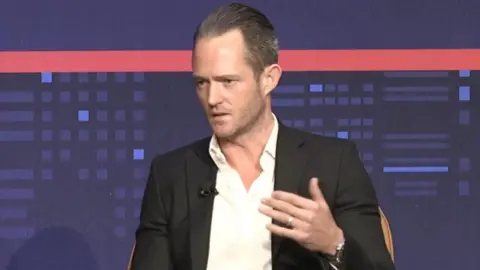Tim Gurner apologises over call for more unemployment to fix worker attitudes
 Australian Financial Review
Australian Financial ReviewOne of Australia's richest men has apologised after he said that unemployment should jump to remind arrogant workers of their place.
"We need to see pain in the economy," Tim Gurner had said.
But Mr Gurner said later that he "deeply" regretted the comments, which sparked a global backlash.
He has previously made headlines by suggesting young people cannot afford homes because they spend too much on avocado toast.
Video of his comments has gone viral, attracting over 23 million views and strong criticism online.
Speaking during a property summit this week, the 41-year-old said the Covid-19 pandemic had changed employees' attitudes and work ethics for the worse - singling out builders as an example.
The gym-owner-turned-real-estate-mogul claimed that shift is hitting productivity in the sector, which - combined with tougher regulations - is fuelling Australia's housing shortage.
He proposed the country's current unemployment rate of 3.7% should rise by 40-50% to reduce "arrogance in the employment market". That would see more than 200,000 people lose their jobs.
"There's been a systematic change where employees feel the employer is extremely lucky to have them," Mr Gurner said.
"We need to remind people they work for the employer, not the other way around."
But later, Mr Gurner said in a post on LinkedIn that he had "made some remarks about unemployment and productivity in Australia that I deeply regret and were wrong".
He said there were "important conversations to have in this environment of high inflation, pricing pressures on housing and rentals due to a lack of supply, and other cost of living issues".
He said his comments were "deeply insensitive" to employees, tradespeople, and families "across Australia" who are affected by cost of living pressures and job losses.
Mr Gurner added that he appreciated that the loss of a job "has a profound impact" on workers "and I sincerely regret that my words did not convey empathy for those in that situation".
Backlash
Mr Gurner's backtrack on his remarks come at a time when many companies are tussling with staff over issues such as remote work and pay.
Shifting attitudes toward employment are also a matter of widespread discussion on social media, giving rise to hashtags like "quiet quitting", a term meant to capture the decision to stop going above and beyond for bosses; and "lazy-girl jobs", which refers to well paying, flexible positions that offer greater work-life balance.
Mr Gurner's earlier comments, which were shared by the Australian Financial Review (AFR) which hosted the summit, drew criticism on social media platforms like X (formerly Twitter), TikTok and LinkedIn.
They were also condemned by Australian MPs from across the political divide. Labor MP Jerome Laxale said they were "comments you'd associate with a cartoon supervillain", while Liberal MP Keith Wolahan said they "could not be more out of touch".
"The loss of a job is not a number. It sees people on the streets and dependent upon food banks," Mr Wolahan told the AFR.
US lawmaker Alexandria Ocasio-Cortez also criticised the property mogul.
"Reminder that major CEOs have skyrocketed their own pay so much that the ratio of CEO-to-worker pay is now at some of the highest levels ever recorded," she wrote on X.
But others - like Minerals Council of Australia chairman Andrew Michelmore - had defended him.
"Employees have got used to earning the same amount of money but not putting in the same hours," Mr Michelmore told the AFR.
Mr Gurner is the chief executive and founder of Gurner Group and has an estimated worth of A$929 million (£479m; $598m).
He has previously spoken about how loans from his grandfather and former boss helped him get his start as a business owner.
Mr Gurner also previously made controversial comments criticising young home buyers for their spending habits, saying in 2017 that when he was saving for his first home, he "wasn't buying smashed avocado for $19 and four coffees at $4 each".
This generated a flurry of debate, and prompted the BBC to ask: how many pieces of avocado toast would it actually take to afford deposit on a home?
It turned out that in London at the time, buyers would have needed to forego 24,499 avocado toasts.
